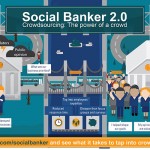 The banking industry has been taking quite a bashing over their role in the global financial mess. Whilst many will suggest that little has changed in the culture in banking since the crash, there are at least signs that changes are creeping in, and social business is at the heart of the changes.
The banking industry has been taking quite a bashing over their role in the global financial mess. Whilst many will suggest that little has changed in the culture in banking since the crash, there are at least signs that changes are creeping in, and social business is at the heart of the changes.
A couple of examples epitomise this shift. First up is Your Bank, a new crowdsourced idea generator from Barclays. On the surface, it’s nothing that innovative in that it largely apes the kind of idea generation tools provided by the likes of Dell and Starbucks years ago. An interesting feature of the site is a YouTube channel where they feature some of the better ideas they receive. You can see an example below.
The application of social in banking is also something KPMG are exploring in greater depth. They’ve launched their social banker 2.0 initiative recently, where they’ll be documenting some of the interesting projects happening in the sector.
Their most recent thought leadership piece is one dear to my own heart, and touches on the cultural changes required by the industry. It talks about the value of crowdsourcing strategic direction from employees, much as companies such as IBM and HCL do today. It was a topic I touched on earlier this month, and the decision making lever is a key component in changing behaviours in any organisation.
The role of the crowd in everything from strategy to employee engagement is something that KPMG believe is here to stay.
“At KPMG we are investing significantly in how we can use social platforms to leverage the power of both the KPMG crowd and the key stakeholder crowds of our clients; such as customer segments or employees. We’re focusing on the use of crowdsourcing technology that enables us to build online communities that can focus on providing insight and ideas to inform key strategic projects. For example, organisations wanting to transform their culture will only do so if they can engage in a strategic two-way conversation about how to achieve that with their employees. Alternatively, organisations wanting to know where they should focus on enhancing the customer experience need deep customer insight – something that tailored online communities consisting of hundreds or thousands of their customers can deliver.” Matt Sevenoaks, the UK Manager for Crowd Connection at KPMG said earlier today.
Suffice to say, deploying the crowd in decision making is only one application of such mass collaboration. Many organisations are also tapping into crowd insights for things like performance appraisals, which sits within the information distribution lever of change.
Both applications work because they have a clear focus, and as such a clear deliverable. In decision making, the end product is a clear input into the strategic and business planning process, whilst performance reviews also provide clear results from employees contributions.
It’s nice to see one of the large consulting companies understanding that the beauty and value of social business comes not from deploying the latest enterprise social network, but in changing the culture and behaviour of employees so that collaboration becomes something they are comfortable and familiar with.
Tough job making this stick I should think. After all, the whole culture of banking was 'me, me, me'. Not exactly collaborative is it?
Yes, I agree, and that's the challenge with most social business efforts. It's a cultural thing, and there are a lot of cultural problems in banking that will take a long time to change. Changing how decisions are made is but one strand of it.
Barclays employees have donned age simulation suits in an effort to appreciate the problems old customers have when banking in-branch, online and over the phone.
http://www.finextra.com/news/fullstory.aspx?newsi…
Great find, thanks for sharing Paul.